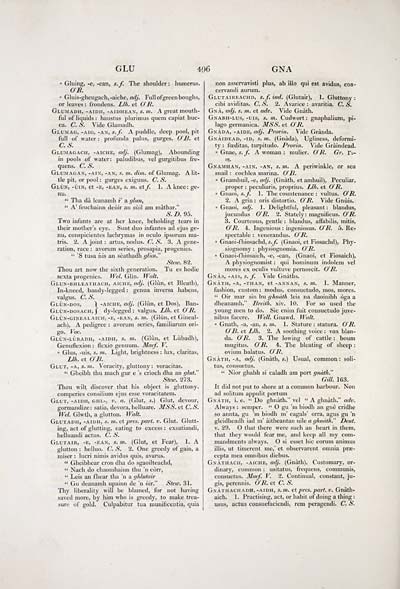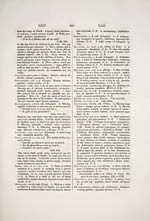Download files
Complete book:
Individual page:
Thumbnail gallery: Grid view | List view

GLU
496 GNA
• Gluing, -e, -ean, s.f. The shoulder: humerus.
OR.
• Gluis-gheugach,-aiche, er«?/. Full of green boughs,
or leaves : frondens. Llà. et O'B.
Glumadh, -aidh, -aidhean, s. m. A great mouth-
ful of liquids : haustus plurimus quern capiat buc-
ca. C. S. Vide Glamadh.
GlUiMAg, -aig, -an, s.f. A puddle, deep pool, pit
full of water : profunda palus, gurges. O'B. et
as.
Glumagach, -aiche, adj. (Glumag), Abounding
in pools of water: paludibus, vel gurgitibus fre-
quens. C. S.
Glumagan, -ain, -an, s. m. dim. of Glumag. Aht-
tle pit, or pool : gurges exiguus. C. S.
Glùn, -ùin, et -E, -EAN, s. m. et/. 1. A knee: ge-
nu.
" Tha da leanamh r' a glun,
" A' feuchainn deòir an suil am màthar."
S. D. 95.
Two infants are at her knee, beholding tears in
their mother's eye. Sunt duo infantes ad ejus ge-
nu, conspicientes lachrymas in oculo ipsoruni ma-
tris. 2. A joint : artus, nodus. C S. 3. A gene-
ration, race : avorum series, prosapia, progenies.
" 'S tusa iiis an sèathadli glim."
Stew. 82.
Tliou art now the sixth generation. Tu es hodie
sexta progenies. Wei. Glin. Walt.
Glun-bhleathach, AICHE, odj. (Glun, et Bleath),
In-kneed, bandy-legged: genua inversa habens,
valgus. C.S.
Glùn-dos, ì -aiche, adj. (Glun, et Dos), Ban-
Glùn-dosach, ] dy-legged : valgus. Llh. et O'R.
Glùn-ginealaich, -e, -ean, s. m. (Glun, et Gineal-
ach), A pedigree : avorum series, familiarum ori-
go. Voc.
Glùn-lùbadh, -aidh, «. m. (Gliin, et Lùbadh),
Genuflexion : flexio genuum. Macf. V.
* Glus, -uis, s. m. Light, brightness : lux, claritas,
Llh. et OB.
Glut, -a, s. m. Voracity, gluttony : voracitas.
" Gheibh thu mach gur e 's crioch dha an glut."
Stew. 273.
Thou wilt discover that his object is gluttony,
comperies consilium ejus esse voracitatem.
Glut, -aidh, ghl-, v. a. (Glut, s.) Glut, devour,
gormandize: satia, devora, helluare. MSS.et C.S.
Wei. Glwth, a glutton. WaU.
Glutadh, -aidh, s. m. el pres. part. v. Glut. Glutt-
ing, act of glutting, eating to excess : exsatiaudi,
helluandi actus. C. S.
Glutair, -e, -ean, s. m. (Glut, et Fear), 1. A
glutton : helluo. C. S. 2. One greedy of gain, a
miser : lucri nimis avidus quis, avarus.
« Gheibhear cron dha do sgaoilteachd,
" Nach do chaomhainn thu 'n còrr,
" Leis an fhear tha 'n a ghlutair
" Gu deanamh upainn de 'n òir." Stew. 31.
Thy liberality will be blamed, for not having
saved more, by him who is greedy, to make trea-
sure of gold. Culpabitur tua raunificentia, quia
non asservavisti plus, ab illo qui est avidus, coa-
cervandi aurum.
Glutaireachd, s.f. ind. (Glutair), 1. Gluttony ;
cibi aviditas. C. S. 2. Avarice : avaritia. C. S.
Gnà, adj. s. m. et adv. Vide Gnàth.
Gnabh-lus, -uis, s. m. Cudwort : gnaphalium, pi-
lago germanica. MSS. et O'B.
Gnàda, -aide, adj. Provin. Vide Grànda.
GnÀidead, -id, s. m. (Gnàda), Ugliness, deformi-
ty : foeditas, turpitudo. Provin. Vide Gràindead.
* Gnae, s. f. A woman : mulier. O'B. Gr. Tu-
Gnamhan, -ain, -an, s. m. A periwinkle, or sea
snail : cochlea marina. O'B.
* Gnanihuil, -e, adj. (Gnàth, et amhuil). Peculiar,
proper : peculiaris, proprius. Llh. et O'B.
» Gnaoi, «./. 1. The countenance : vultus. O'R.
2. A grin : oris distortio. OR. Vide Gnùis.
* Gnaoi, adj. 1. Delightful, pleasant: blandus,
jucundus O'R. 2. Stately: magnificus. O'i?.
3. Courteous, gentle : blandus, affabilis, mitis,
O'R. 4-. Ingenious : ingeniosus. O'R. 5. Re-
spectable : venerandus. O'B.
* Gnaoi-fliiosachd, s.f. (Gnaoi, et Fiosachd), Phy-
siognomy : physiognomia. O'B.
* Gnaoi-fliiosaich, -e, -ean, (Gnaoi, et Fiosaich),
A physiognomist : qui hominum indolem vel
mores ex oculis vultuve pernoscit. O'B.
Gnàs, -ais, s. f Vide Gnàths.
Gnàth, -a, -than, et -annan, «. m. 1. Manner,
fashion, custom : modus, consuetudo, mos, mores.
" Oir mar sin bu ghnàth leis na daoinibh òga a
dheanamh." Breith. xiv. 10. For so used the
young men to do. Sic enim fuit consuetudo juve-
nibus facere. Well. Gnawd. Walt.
* Gnath, -a, -an, s. m. 1. Stature : statura. O'B.
O'B. et Llh. 2. A soothing voice : vox blan-
da. O'B. 3. The lowing of cattle : boum
niugitus. O'B. 4. The bleating of sheep :
ovium balatus. O'B.
Gnàtii, -a, adj. (Gnath, s.) Usual, common : soli-
" Nior ghabh si caladh am port giiàiìi."
Gill. 163.
It did not put to shore at a common harbour. Non
ad solitum appulit portum
Gnath, i. e. " Do ghnàth." vel " A ghnàth." adv.
Always : semper. " O gu 'm biodh an gnè crldhe
so annta, gu 'm biodh m' eagals' orra, agus gu 'n
gleidheadh iad m' àitheantan uile a ghnàth." Deut.
V. 29. O that there were such an heart in them,
that thej' would fear me, and keep all my com-
mandments always. O si esset hie eorum animus
illis, ut timerent me," et observarent omnia prae-
cepta mea omnibus diebus.
GnÀthacii, -aiche, adj. (Gnath), Customary, or-
dinary, common : usitatus, frequens, communis,
consuetus. Macf. V. 2. Continual, constant, ju-
gis, perennis. O'B. et C. S.
Gnàthachadh, -AIDH, s.m. et pres. part. V. Gnàth-
aich. 1. Practising, act, or habit of doing a thing:
usus, actus consueifaciendi, rem peragendi. C. S.
496 GNA
• Gluing, -e, -ean, s.f. The shoulder: humerus.
OR.
• Gluis-gheugach,-aiche, er«?/. Full of green boughs,
or leaves : frondens. Llà. et O'B.
Glumadh, -aidh, -aidhean, s. m. A great mouth-
ful of liquids : haustus plurimus quern capiat buc-
ca. C. S. Vide Glamadh.
GlUiMAg, -aig, -an, s.f. A puddle, deep pool, pit
full of water : profunda palus, gurges. O'B. et
as.
Glumagach, -aiche, adj. (Glumag), Abounding
in pools of water: paludibus, vel gurgitibus fre-
quens. C. S.
Glumagan, -ain, -an, s. m. dim. of Glumag. Aht-
tle pit, or pool : gurges exiguus. C. S.
Glùn, -ùin, et -E, -EAN, s. m. et/. 1. A knee: ge-
nu.
" Tha da leanamh r' a glun,
" A' feuchainn deòir an suil am màthar."
S. D. 95.
Two infants are at her knee, beholding tears in
their mother's eye. Sunt duo infantes ad ejus ge-
nu, conspicientes lachrymas in oculo ipsoruni ma-
tris. 2. A joint : artus, nodus. C S. 3. A gene-
ration, race : avorum series, prosapia, progenies.
" 'S tusa iiis an sèathadli glim."
Stew. 82.
Tliou art now the sixth generation. Tu es hodie
sexta progenies. Wei. Glin. Walt.
Glun-bhleathach, AICHE, odj. (Glun, et Bleath),
In-kneed, bandy-legged: genua inversa habens,
valgus. C.S.
Glùn-dos, ì -aiche, adj. (Glun, et Dos), Ban-
Glùn-dosach, ] dy-legged : valgus. Llh. et O'R.
Glùn-ginealaich, -e, -ean, s. m. (Glun, et Gineal-
ach), A pedigree : avorum series, familiarum ori-
go. Voc.
Glùn-lùbadh, -aidh, «. m. (Gliin, et Lùbadh),
Genuflexion : flexio genuum. Macf. V.
* Glus, -uis, s. m. Light, brightness : lux, claritas,
Llh. et OB.
Glut, -a, s. m. Voracity, gluttony : voracitas.
" Gheibh thu mach gur e 's crioch dha an glut."
Stew. 273.
Thou wilt discover that his object is gluttony,
comperies consilium ejus esse voracitatem.
Glut, -aidh, ghl-, v. a. (Glut, s.) Glut, devour,
gormandize: satia, devora, helluare. MSS.et C.S.
Wei. Glwth, a glutton. WaU.
Glutadh, -aidh, s. m. el pres. part. v. Glut. Glutt-
ing, act of glutting, eating to excess : exsatiaudi,
helluandi actus. C. S.
Glutair, -e, -ean, s. m. (Glut, et Fear), 1. A
glutton : helluo. C. S. 2. One greedy of gain, a
miser : lucri nimis avidus quis, avarus.
« Gheibhear cron dha do sgaoilteachd,
" Nach do chaomhainn thu 'n còrr,
" Leis an fhear tha 'n a ghlutair
" Gu deanamh upainn de 'n òir." Stew. 31.
Thy liberality will be blamed, for not having
saved more, by him who is greedy, to make trea-
sure of gold. Culpabitur tua raunificentia, quia
non asservavisti plus, ab illo qui est avidus, coa-
cervandi aurum.
Glutaireachd, s.f. ind. (Glutair), 1. Gluttony ;
cibi aviditas. C. S. 2. Avarice : avaritia. C. S.
Gnà, adj. s. m. et adv. Vide Gnàth.
Gnabh-lus, -uis, s. m. Cudwort : gnaphalium, pi-
lago germanica. MSS. et O'B.
Gnàda, -aide, adj. Provin. Vide Grànda.
GnÀidead, -id, s. m. (Gnàda), Ugliness, deformi-
ty : foeditas, turpitudo. Provin. Vide Gràindead.
* Gnae, s. f. A woman : mulier. O'B. Gr. Tu-
Gnamhan, -ain, -an, s. m. A periwinkle, or sea
snail : cochlea marina. O'B.
* Gnanihuil, -e, adj. (Gnàth, et amhuil). Peculiar,
proper : peculiaris, proprius. Llh. et O'B.
» Gnaoi, «./. 1. The countenance : vultus. O'R.
2. A grin : oris distortio. OR. Vide Gnùis.
* Gnaoi, adj. 1. Delightful, pleasant: blandus,
jucundus O'R. 2. Stately: magnificus. O'i?.
3. Courteous, gentle : blandus, affabilis, mitis,
O'R. 4-. Ingenious : ingeniosus. O'R. 5. Re-
spectable : venerandus. O'B.
* Gnaoi-fliiosachd, s.f. (Gnaoi, et Fiosachd), Phy-
siognomy : physiognomia. O'B.
* Gnaoi-fliiosaich, -e, -ean, (Gnaoi, et Fiosaich),
A physiognomist : qui hominum indolem vel
mores ex oculis vultuve pernoscit. O'B.
Gnàs, -ais, s. f Vide Gnàths.
Gnàth, -a, -than, et -annan, «. m. 1. Manner,
fashion, custom : modus, consuetudo, mos, mores.
" Oir mar sin bu ghnàth leis na daoinibh òga a
dheanamh." Breith. xiv. 10. For so used the
young men to do. Sic enim fuit consuetudo juve-
nibus facere. Well. Gnawd. Walt.
* Gnath, -a, -an, s. m. 1. Stature : statura. O'B.
O'B. et Llh. 2. A soothing voice : vox blan-
da. O'B. 3. The lowing of cattle : boum
niugitus. O'B. 4. The bleating of sheep :
ovium balatus. O'B.
Gnàtii, -a, adj. (Gnath, s.) Usual, common : soli-
" Nior ghabh si caladh am port giiàiìi."
Gill. 163.
It did not put to shore at a common harbour. Non
ad solitum appulit portum
Gnath, i. e. " Do ghnàth." vel " A ghnàth." adv.
Always : semper. " O gu 'm biodh an gnè crldhe
so annta, gu 'm biodh m' eagals' orra, agus gu 'n
gleidheadh iad m' àitheantan uile a ghnàth." Deut.
V. 29. O that there were such an heart in them,
that thej' would fear me, and keep all my com-
mandments always. O si esset hie eorum animus
illis, ut timerent me," et observarent omnia prae-
cepta mea omnibus diebus.
GnÀthacii, -aiche, adj. (Gnath), Customary, or-
dinary, common : usitatus, frequens, communis,
consuetus. Macf. V. 2. Continual, constant, ju-
gis, perennis. O'B. et C. S.
Gnàthachadh, -AIDH, s.m. et pres. part. V. Gnàth-
aich. 1. Practising, act, or habit of doing a thing:
usus, actus consueifaciendi, rem peragendi. C. S.
Set display mode to: Large image | Transcription
Images and transcriptions on this page, including medium image downloads, may be used under the Creative Commons Attribution 4.0 International Licence unless otherwise stated. ![]()
| Early Gaelic Book Collections > Blair Collection > Dictionarium scoto-celticum > Volume I > (566) |
|---|
| Permanent URL | https://digital.nls.uk/76581803 |
|---|
| Description | Lacks half title page in Volume 1. |
|---|---|
| Attribution and copyright: |
|
| Description | A selection of books from a collection of more than 500 titles, mostly on religious and literary topics. Also includes some material dealing with other Celtic languages and societies. Collection created towards the end of the 19th century by Lady Evelyn Stewart Murray. |
|---|
| Description | Selected items from five 'Special and Named Printed Collections'. Includes books in Gaelic and other Celtic languages, works about the Gaels, their languages, literature, culture and history. |
|---|

